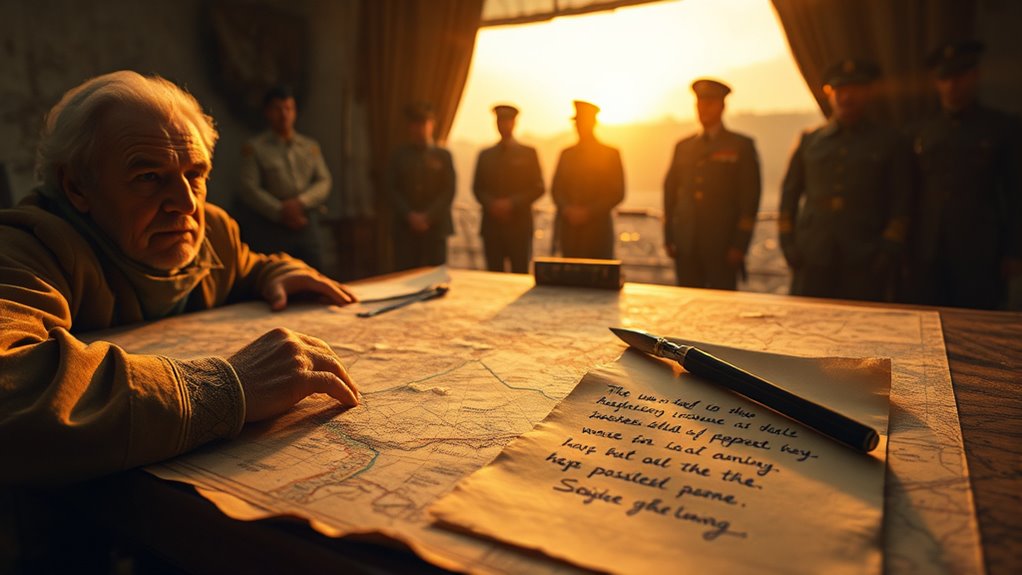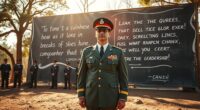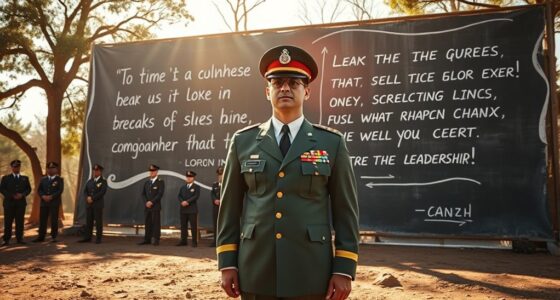A powerful strategy can often be summed up in a single, memorable sentence that inspires action and clarity. Short quotes like “We shall fight on the beaches” or “Veni, Vidi, Vici” rally troops and focus efforts during chaos. Brevity sharpens messages, minimizing confusion and boosting morale. If you want to discover more about how these concise words shaped history’s most decisive wins, there’s much more to uncover behind these legendary phrases.
Key Takeaways
- A powerful, concise quote can unify forces and clarify strategic goals, boosting morale and focus.
- Short, memorable statements like “Attack is the best defense” encapsulate tactics that can turn battles.
- Brevity in strategy helps reduce misunderstandings, enabling swift, decisive military actions.
- Iconic quotes such as “We shall fight on the beaches” inspire perseverance and resilience under pressure.
- Effective one-sentence strategies simplify complex plans into clear directives that can influence outcomes.
The Power of a Single Sentence in Military Strategy

A single, well-crafted sentence can shape the entire course of military strategy. Brevity’s impact lies in its ability to distill complex ideas into clear, memorable directives, ensuring your message is understood instantly. This strategic simplicity cuts through confusion, aligning your forces with a unified purpose. When you craft a concise, powerful statement, you cut through the noise and focus on what truly matters. Such sentences serve as rallying calls, guiding decisions and inspiring action even in chaos. You realize that a well-chosen phrase can encapsulate an entire strategy, making it easier for everyone to remember and execute. Ultimately, the clarity of communication in a single sentence can be the difference between victory and defeat, as it ensures your strategic intent is unmistakably conveyed and universally understood.
Iconic Quotes That Changed the Course of Battles

Throughout history, a single, powerful quote has often turned the tide of a battle or inspired troops to victory. These iconic quotes reveal battle tactics and leadership insights that resonate beyond the battlefield. When you hear “We shall fight on the beaches,” you recognize the resolve and strategic perseverance that can rally troops in adversity. Such words encapsulate key tactics—like surprise attacks or unwavering morale—and demonstrate how leadership inspires action. These quotes serve as mental ammunition, shaping decisions and boosting confidence. They remind you that words, when chosen with purpose, can be as impactful as weapons. Understanding the benefits of glycolic acid exfoliating toner and how it promotes skin renewal can be as transformational as a well-timed battle cry. By understanding these legendary statements, you grasp how a well-timed phrase can influence the course of history and shift the outcome of conflicts.
Lessons From History’s Most Memorable Strategy Statements

Have you ever considered how a single, memorable statement can shape strategic decisions and alter the course of history? Throughout history, leadership quotes have captured essential lessons about battle tactics and decision-making. For example, Napoleon’s famous “Impossible is a word to be found only in the dictionary of fools” emphasizes confidence and innovation in strategy. These statements serve as lessons, inspiring leaders to think differently and act decisively. They also highlight the importance of clarity and conviction in leadership, shaping how battles are fought and won. By studying these powerful quotes, you learn that effective strategy often hinges on simple yet profound insights. These lessons endure because they distill complex tactics into memorable, motivating words that continue to influence military and strategic thinking today. Understanding strategic principles is crucial for appreciating how these quotes have stood the test of time and remain relevant in modern decision-making.
How Brevity Can Be a Weapon in Warfare

Memorable strategy statements often succeed because they communicate complex ideas with striking brevity. In warfare, brevity acts as a powerful weapon by enabling concise communication that cuts through chaos. When your message is clear and straightforward, it minimizes misunderstandings and accelerates decision-making. Strategic simplicity ensures your commands are easily remembered and quickly acted upon, preventing confusion on the battlefield. Short, impactful quotes can boost morale and rally troops, reinforcing your core objectives without overwhelming them with details. Brevity also keeps your opponent guessing, as ambiguous or overly complex messages can be exploited. Ultimately, using concise communication turns strategic clarity into a weapon—one that can decisively shift the course of conflict in your favor. Additionally, employing simple yet effective language enhances the likelihood that your message will resonate quickly and be acted upon appropriately.
Modern Leaders and Their Impactful Strategic Sayings

Modern leaders frequently craft strategic sayings that resonate because they combine brevity with profound insight. These sayings often draw from naval tactics, emphasizing swift, decisive actions that can turn the tide of battle. They also highlight the power of psychological warfare, showing how mental strength and morale can be more influential than brute force. When you hear a leader’s succinct quote, it’s usually a distilled lesson rooted in real-world experience—such as knowing when to strike or retreat, or how to manipulate perceptions. These short sayings serve as rallying cries, guiding armies and nations through complex conflicts. By mastering the art of concise communication, modern leaders leverage their words to inspire, intimidate, and outthink opponents, shaping the course of history with simple yet impactful sentences. Empowering families in caregiving journeys can also benefit from strategic communication that emphasizes clarity and purpose.
Frequently Asked Questions
How Do Short Quotes Influence Modern Military Decision-Making?
Short quotes influence your modern military decision-making by providing clear, memorable messages that cut through complexity. They draw on historical context, emphasizing key principles quickly. When you use concise, impactful quotes, communication clarity improves, ensuring everyone understands strategic priorities swiftly. This approach helps decision-makers stay focused on core objectives, fostering unity and swift action, especially under pressure. Short quotes become powerful tools to motivate and reinforce strategic intent in today’s fast-paced military environments.
What Criteria Determine a Quote’s Effectiveness in Warfare?
Think of a quote as a sharp arrow—its effectiveness hinges on targeting the heart of the message. You decide based on its historical context, ensuring it resonates with the moment and morale. Linguistic precision is your bowstring, making the message clear and impactful. If it’s brief yet potent, it can rally troops or turn tides, proving that the right words, succinctly wielded, cut deeper than armies in warfare.
Can a Single Sentence Truly Alter Military Strategies?
You might wonder if a single sentence can truly change military strategies. In history, such statements often reflect leadership impact, shaping decisions during critical moments. They carry powerful insights rooted in historical context, influencing commanders’ actions and mindset. While one sentence alone may not overhaul entire plans, it can inspire, clarify, or reinforce strategy, demonstrating how words hold significant power in shaping military outcomes and influencing future tactics.
How Do Cultural Differences Affect the Interpretation of Strategic Quotes?
Like the Tower of Babel, cultural perceptions shape how you interpret strategic quotes. Your cultural background influences your view, leading to interpretive biases that can distort or deepen understanding. What’s clear in one culture might be misunderstood in another. Recognizing these differences helps you appreciate diverse perspectives, ensuring you don’t miss crucial nuances. Ultimately, it’s about bridging gaps to fully grasp the power of words, regardless of your cultural lens.
Are There Risks Associated With Relying on Brief Strategic Statements?
When you rely on brief strategic statements, you should be aware of brevity risks and misinterpretation pitfalls. Short quotes can oversimplify complex ideas, leading to misunderstandings or misuse. You might miss critical nuances or context, which can result in flawed decisions. To avoid these risks, always supplement short quotes with detailed explanations and consider cultural or situational factors that could influence how the message is received and applied.
Conclusion
Just as a single arrow can pierce armor, one powerful quote can shift the tide of battle. Your words, like a well-aimed spear, carry the weight to inspire, deceive, or rally troops. Remember, in war as in life, brevity is your shield and sword—cutting through chaos with clarity. Master the art of the concise, and you’ll find that even the smallest sentence can command armies and change history.
Joy, as our Editor in Chief, ensures the highest standard of content. Her talent in writing is complemented by her attention to detail and passion for literature and culture. Joy’s expertise and love for the English language shine through in her editorial work, making each piece a testament to quality and clarity.










